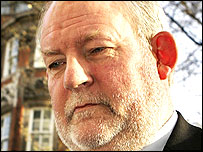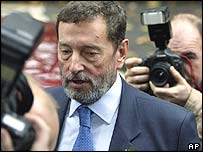Handout: Individual Ministerial Responsibility
18th August 2015
Individual Ministerial Responsibility
WHO? Lord Carrington (Foreign Secretary) in 1982
WHY? For failing to take due note of warnings that Argentina was planning a Falklands invasion
 In the days before the invasion British intelligence became aware that a military crisis was fast approaching. Preparations to send a task force to repossess the Falklands began three days before they were invaded.
In the days before the invasion British intelligence became aware that a military crisis was fast approaching. Preparations to send a task force to repossess the Falklands began three days before they were invaded.
Once it broke, the news of the invasion exploded like a political bombshell. Parliament was recalled on a weekend for the first time in decades.
The Foreign Secretary, Lord Carrington, and two junior ministers had resigned by the end of the week. They took the blame for Britain’s poor preparations and plans to decommission HMS Endurance, the navy’s only Antarctic patrol vessel. It was a move which may have lead the Junta to believe the UK had little interest in keeping the Falklands.
WHO? Edwina Currie (Health Secretary) in 1988
WHY? Over salmonella in eggs
 Health minister Edwina Currie has provoked outrage by saying most of Britain’s egg production is infected with the salmonella bacteria. Edwina Currie initially received support from Prime Minister Margaret Thatcher and Health Secretary Kenneth Clarke.
Health minister Edwina Currie has provoked outrage by saying most of Britain’s egg production is infected with the salmonella bacteria. Edwina Currie initially received support from Prime Minister Margaret Thatcher and Health Secretary Kenneth Clarke.
She weathered the political storm for a further two weeks before mounting writs against her from the farming industry forced her resignation.
As egg sales plummeted, the government was forced to offer a compensation package of millions of pounds to cover the cost of purchasing surplus eggs and for the slaughter of unwanted hens.
WHO? Norman Lamont (Chancellor) in 1993
WHY? After the withdrawal of the UK from the European Monetary System
 Norman Lamont’s departure from government was a result of Black Wednesday – when, as chancellor, he was forced to remove sterling from the ERM, despite earlier assurances that he would not do so. It was a crisis that severely rocked the government, destroying the Conservatives’ long-standing reputation for economic competence and calling into question John Major’s credibility as prime minister. There was much speculation of a leadership challenge unless the prime minister could regain his party’s confidence. Mr Lamont was heavily criticised for his role in Black Wednesday and came under considerable pressure to resign as chancellor in wake of the episode. But it was not for another eight months, in May 1993, that Mr Lamont resigned. In a speech to a hushed Commons, the former chancellor delivered a stinging attack on Mr Major’s government famously accusing it of “being in office, but not in power”. Mr Lamont’s resignation speech was not a fatal intervention but it did mark the beginning of what would be turbulent times for Mr Major and his government.
Norman Lamont’s departure from government was a result of Black Wednesday – when, as chancellor, he was forced to remove sterling from the ERM, despite earlier assurances that he would not do so. It was a crisis that severely rocked the government, destroying the Conservatives’ long-standing reputation for economic competence and calling into question John Major’s credibility as prime minister. There was much speculation of a leadership challenge unless the prime minister could regain his party’s confidence. Mr Lamont was heavily criticised for his role in Black Wednesday and came under considerable pressure to resign as chancellor in wake of the episode. But it was not for another eight months, in May 1993, that Mr Lamont resigned. In a speech to a hushed Commons, the former chancellor delivered a stinging attack on Mr Major’s government famously accusing it of “being in office, but not in power”. Mr Lamont’s resignation speech was not a fatal intervention but it did mark the beginning of what would be turbulent times for Mr Major and his government.
However, sometimes there have been calls for ministers to go and they have resisted:
 WHO? Jacqui Smith (Home Secretary) in 2008
WHO? Jacqui Smith (Home Secretary) in 2008
WHY? She said it was unsafe for her to walk the streets near her Peckham home
http://www.express.co.uk/news/uk/32073/Unsafe-streets-remark-ignites-row
 WHO? John Prescott (Deputy Prime Minister) in 2006
WHO? John Prescott (Deputy Prime Minister) in 2006
WHY? Over his son’s property dealings in Prescott’s Hull constituency
http://news.bbc.co.uk/1/hi/uk/politics/64534.stm
 WHO? Charles Clarke (Home Secretary) in 2006
WHO? Charles Clarke (Home Secretary) in 2006
WHY? Over the foreign prisoners’ fiasco
http://news.bbc.co.uk/1/hi/uk_politics/4946566.stm
By far the most common reason for ministers resigning are personal reasons
(i.e. not directly connected to their ability to run a particular department):
 WHO? Peter Mandelson (TWICE!) in 1998 and 2001
WHO? Peter Mandelson (TWICE!) in 1998 and 2001
WHY? Over his home loan (1998) and his relationship with the Hinduja brothers (2001)
http://www.guardian.co.uk/world/2000/oct/17/qanda.mandelson
http://news.bbc.co.uk/1/hi/uk_politics/1134392.stm
 WHO? David Blunkett (TWICE!) in 2004 and 2005
WHO? David Blunkett (TWICE!) in 2004 and 2005
WHY? Over allegations of fast tracking a visa for his lover’s nanny (2004) and a conflict regarding shares in a DNA company (2005)
http://news.bbc.co.uk/1/hi/uk_politics/4099581.stm
http://news.bbc.co.uk/1/hi/uk_politics/4398004.stm
 WHO? Ron Davis (Welsh Secretary) in 1998
WHO? Ron Davis (Welsh Secretary) in 1998
WHY? Over his so-called ‘moment of madness’ on Clapham Common
http://news.bbc.co.uk/1/hi/uk_politics/204691.stm
What is a resigning issue? (BBC News)
http://news.bbc.co.uk/1/hi/uk_politics/3422421.stm

0 Comments